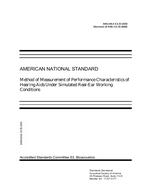Click here to purchase
This standard describes techniques used to measure hearing aids under simulated conditions of realear use. The need for such a standard arises from the importance of including the acousticalvariations in the performance data that are caused when hearing aids are worn. For example, thediffraction of the body and head of a hearing aid wearer on incident sound can significantly change theinput sound pressure to a hearing aid microphone. For the purpose of these measurements, asuitable manikin and ear simulator are used to represent a typical hearing aid wearer. Acousticalrequirements of the test space as well as how the manikin is positioned with respect to the soundsource are given. Two methods are presented by which to control the level of the incident sound fieldat the location of the hearing aid on the manikin during the testing. Procedures are provided to obtainthe insertion gain, or the amount by which the hearing aid changes the eardrum sound pressure in theear simulator of the manikin relative to that in the unaided condition. Procedures are also provided toobtain the directional response of the manikin as a function of azimuth and elevation of the soundsource, with and without the assistance of a hearing aid, and to calculate the directivity index from thedirectional response. The gains obtained with a hearing aid are distinguished by whether the unaidedmanikin gain is included in (simulated real-ear aided gain) or subtracted from (simulated insertion gain)the aided gain.
Product Details
- Published:
- 02/25/2010
- ANSI:
- ANSI Approved
- Number of Pages:
- 49
- File Size:
- 1 file , 1.3 MB
